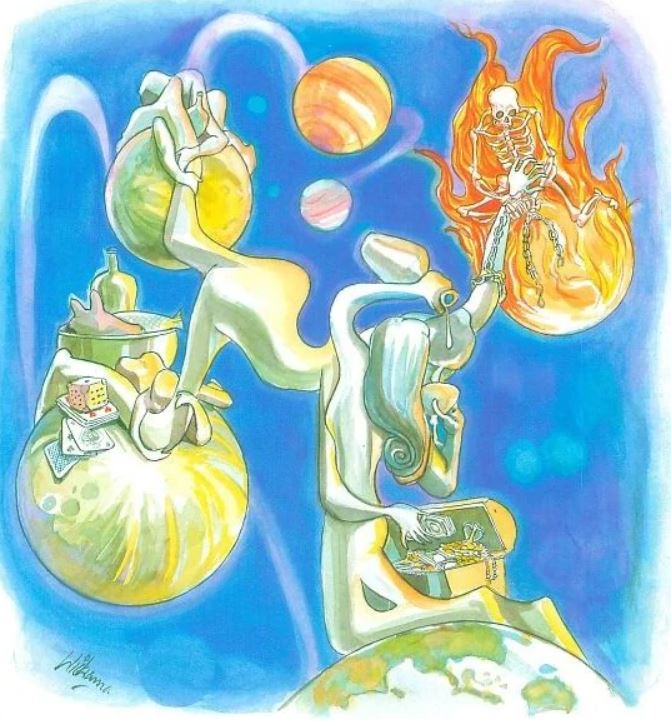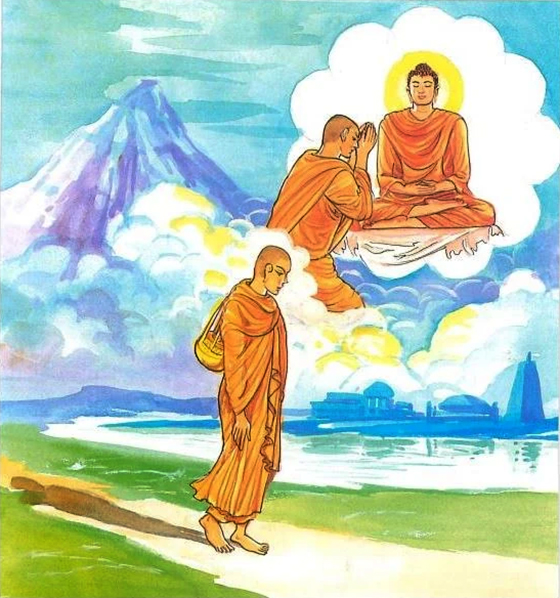
RFA/Chin Chetha
Verse 19: Though he recites much the Sacred Texts (Tipitaka), but is negligent and does not practise according to the Dhamma, like a cowherd who counts the cattle of others, he has no share in the benefits of the life of a bhikkhu (i.e., Magga-phala).
Verse 20: Though he recites only a little of the Sacred Texts (Tipitaka), but practises according to the Dhamma, eradicating passion, ill will and ignorance, clearly comprehending the Dhamma, with his mind freed from moral defilements and no longer clinging to this world or to the next, he shares the benefits of the life of a bhikkhu (i.e., Magga-phala).
1. suvimuttacitto: Mind freed from moral defilements; this has been achieved through perfect practice and clear comprehension of the Dhamma.
2. sa bhagava samannassa hoti: lit., shares the benefits of the life of a samana (a bhikkhu). According to the Commentary, in this context, it means, “Shares the benefits of Magga-phala.”
While residing at the Jetavana monastery, the Buddha uttered Verses (19) and (20) of this book, with reference to two bhikkhus who were friends.
Once there were two friends of noble family, two bhikkhus from Savatthi. One of them learned the Tipitaka and was very proficient in reciting and preaching the sacred texts. He taught five hundred bhikkhus and became the instructor of eighteen groups of bhikkhus. The other bhikkhu striving diligently and ardently in the course of Insight Meditation attained arahatship together with Analytical Insight.
On one occasion, when the second bhikkhu came to pay homage to the Buddha, at the Jetavana monastery, the two bhikkhus met. The master of the Tipitaka did not realize that the other had already become an arahat. He looked down on the other, thinking that this old bhikkhu knew very little of the sacred texts, not even one out of the five Nikayas or one out of the three Pitakas. So he thought of putting questions to the other, and thus embarass him. The Buddha knew about his unkind intention and he also knew that as a result of giving trouble to such a noble disciple of his, the learned bhikkhu would be reborn in a lower world.
So, out of compassion, the Buddha visited the two bhikkhus to prevent the scholar from questioning the other bhikkhu. The Buddha himself did the questioning. He put questions on jhanas and maggas to the master of the Tipitaka; but he could not answer them because he had not practised what he had taught. The other bhikkhu, having practised the Dhamma and having attained arahatship, could answer all the questions. The Buddha praised the one who practised the Dhamma (i.e., a vipassaka), but not a single word of praise was spoken for the learned scholar (i.e., a ganthika).
The resident disciples could not understand why the Buddha had words of praise for the old bhikkhu and not for their learned teacher. So, the Buddha explained the matter to them. The scholar who knows a great deal but does not practise in accordance with the Dhamma is like a cowherd, who looks after the cows for wages, while the one who practises in accordance with the Dhamrna is like the owner who enjoys the five kinds of produce of the cows*. Thus, the scholar enjoys only the services rendered to him by his pupils but not the benefits of Magga-phala. The other bhikkhu, though he knows little and recites only a little of the sacred texts, having clearly comprehended the essence of the Dhamma and having practised diligently and strenuously, is an ‘anudhammacari’**, who has eradicated passion, ill will and ignorance. His mind being totally freed from moral delilements and from all attachments to this world as well as to the next, he truly shares the benefits of Magga-phala.
Then the Buddha spoke in verse as follows:
Verse 19: Though he recites much the Sacred Texts (Tipitaka), but is negligent and does not practise according to the Dhamma, like a cowherd who counts the cattle of others, he has no share in the benefits of the life of a bhikkhu (i.e., Magga-phala).
Verse 20: Though he recites only a little of the Sacred Texts (Tipitaka), but practises according to the Dhamma, eradicating passion, ill will and ignorance, clearly comprehending the Dhamma, with his mind freed from moral defilements and no longer clinging to this world or to the next, he shares the benefits of the life of a bhikkhu (i.e., Magga-phala). Continue reading →












